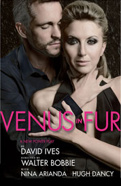What's Up, Wes Bentley? The American Beauty Star Gets Kinky in Venus in Fur
Rather than finding a nice coming-of-age, slice-of-life drama for his stage debut, Wes Bentley is starring as a playwright who adapts the 1870 erotic novel Venus in Fur, then ends up acting the lead part (complete with a Continental accent) in the rehearsal room opposite a vivacious/voracious young actress who’s arrived to audition. It this sounds confusing, you’re better off just seeing David Ives’ new play at Classic Stage Company, with Bentley and Nina Arianda discreetly exploring the origins of S&M. Bentley went M.I.A. from the movie business after his smashing debut in American Beauty as haunted teen Ricky Fitts, but he’s newly committed to acting and loving life off-Broadway.
So Wes, what did you think when you read the stage version of Venus in Fur?
I loved it. It just kept getting progressively more crazy, but in a clever way—at any moment, I didn’t know where I was. I’ve always loved David Ives’ writing. He's so smart, and there’s so much tension in the language and in [director] Walter [Bobbie’s] blocking. I feel spoiled that this is my first stage experience. It’s a blast to do.
How on earth do you describe the play to your friends?
Ha! That’s difficult. Sometimes I will start by saying, “It’s a play about where masochism came from,” and there’s usually dead silence. So I say, “Have you heard of the novel Venus in Fur? It’s about a guy who wrote an adaptation of the novel that comes to life onstage in a modern way.” But a lot of people don’t know the novel, so I basically end up saying, “Come see the show. It’s an hour and a half, and it’s a firecracker.”
Had you read the novel?
I read it as soon as I knew I was going to audition for this. Sacher-Masoch is really clever and witty and very passionate. What’s great about the book is that, like the play, nothing we think of as sexual happens, but it’s full of the tension of sexuality. It makes it clear that a masochist is someone who needs pain to feel.
Why did you include a shout-out to the drama club at Sylvan Hills High School in Sherwood, Arkansas, in your bio?
My drama teacher, Jeannie Gray, is there. She was the one who got me into acting. She really pushed me on it, and even had me teaching a class in directing my senior year.
How did a boy from Arkansas end up at Juilliard?
My mom knew Juilliard had an acting program, and she felt I should reach for it. We drove up to Chicago and I auditioned and got in. I stayed for a year. It’s a great program, but I couldn’t see myself staying for four years, and I had some opportunities in film.
Why did you pull away from acting after the success of American Beauty?
The business [side] became the prominent part of my career and I wasn’t so keen on that, especially at a younger age. I was 21 when American Beauty came out. I tried to handle the pressure, but I didn’t do a good job. I didn’t know what to do with the attention. One of my biggest rules as an actor is that I don’t want people to know who I am; I want them to enjoy a character. My fear was blown out of proportion, and I started to lose a sense of perspective about what was really going on. I became sort of a recluse, and that led to me say, “I don’t want to do this anymore.” About a year and a half ago, I had a big awakening. My perspective came back, along with a love for the business that I didn’t have before.
You must have understood what a special movie American Beauty was, and how good you were in it.
Oh yeah, and I’ve always been really proud of that. It was a moving film—that character [of Ricky] in particular. I’ve heard all kinds of stories about how it applied to people’s lives. I’m so thankful for that; I never hid from that. What I hid from was when people kind of put me up [for roles] when I felt I hadn’t proved myself yet. They just wanted to make money, and I pulled away from that.
Well, now you get to relaunch yourself as a grownup.
That was another reason I kept pulling back: As far as acting in films, people don’t fully buy some things you’re putting out there until you’re 30. You don’t have the life experience, and the characters aren’t as interesting. [I thought] if I’m going to come back, I’m going to do it when I’m 30—and that’s now.
